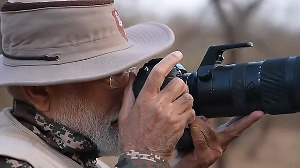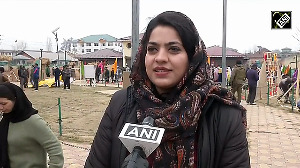The Central Bureau of Investigation has reopened investigations into the 2006 Nanded blast, which is being seen as a key indicator of a Hindutva group's involvement in terror activities.
The CBI also took custody of Rakesh Dhawde, one of the accused in the September 29 Malegaon blast even as the probe agency claimed that he had provided arms training to those allegedly involved in the Nanded incident.
The decision to reopen the case was taken after some leads emerged during the investigations into the Malegaon case
in which 11 people, including Lt Col Shrikant Purohit, have been arrested.
"We have reopened the Nanded investigations," CBI Director Ashwani Kumar told PTI on Sunday in New Delhi.
Dhawde has been remanded in CBI custody for three days, a senior CBI officer said, adding, if need arises, they would
move court to take custody of others also.
The CBI had charge-sheeted ten people in the Nanded case. But sources said it has not been able to trace the leads, as yet, provided by some of the accused who claimed to have admitted, before investigators, their role in the earlier
cases.
The CBI would also try and probe the links of those arrested in the Malegaon case including Lt Colonel Purohit,
with the Nanded case.
Earlier, CBI's role had come into question from the probe conducted by central security agencies and Maharashtra's
ATS as the agency appeared to have not taken due cognisance of deposition of one of the accused arrested in the Nanded case.
The accused, whose voice had to be restored by operating his vocal chord which was damaged in the blast, had told
investigators that Naresh Rajkondwar, a Bajrang Dal activist, had allegedly planned three blasts outside mosques that shook Jalna and Parbani in Maharashtra in 2003 and 2004.
Several rounds of meetings took place between the CBI officers and those belonging to central security agencies whose sleuths, probing the Malegaon blasts, have pointed towards some alleged loopholes in the probe carried out by the
premier investigating agency.
The Nanded bomb blast took place in the intervening night of April 4 and 5, 2006 allegedly at the residence of
Laxman Rajkondwar, said to be an RSS worker. Rajkondwar's son Naresh and Himanshu Panse, a VHP activist, were killed while allegedly assembling a bomb.
Recoveries made from Rajkondwar's house allegedly included Muslim skull caps, fake beards and a plan showing
that the target was to hit a mosque at Aurangabad, nearly 200 km from Nanded.
The sources said CBI would also be focussing more on recovery of over a ton of explosives used in manufacturing of
fire crackers and as also the possible links between the Malegaon incident and the previous blast cases in question.
They said that one of the accused had told the investigators that he was allegedly sent to Pune by Naresh on his train ticket on the day when crude explosive material was thrown outside a mosque in Jalna in 2004, a move aimed at
creating an alibi to show that Naresh was not in town when the blast took place.
The CBI was earlier also asked by central security agencies as to why the call details of Naresh were not investigated properly, the sources said and claimed that one such call had been traced to an important functionary of a saffron outfit in Ayodhya.
The agency had investigated the Nanded blast and filed a chargesheet on March 15, this year against 10 people who
included Sanjay Chowdhury, Yogesh Deshpande, Maruti Wagah, Gunniraj Thakur and Mahesh Pandey, allegedly associated with Bajrang Dal besides the two who were killed.






 © 2025
© 2025